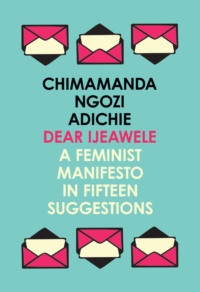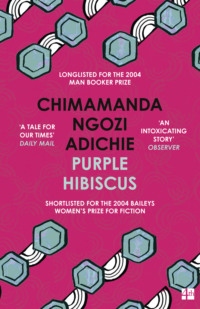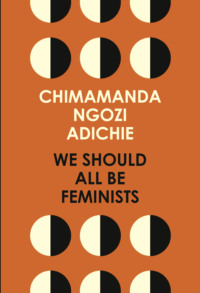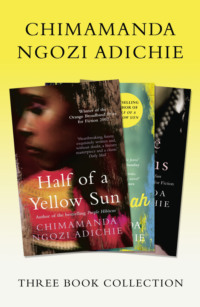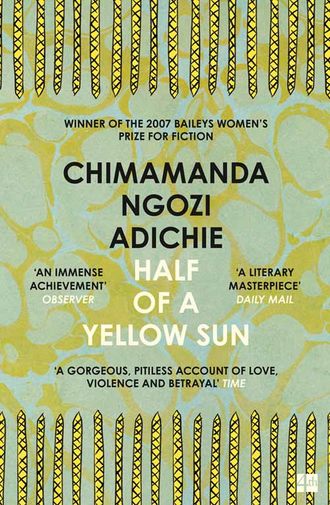
Полная версия
Half of a Yellow Sun
‘The best surprise!’
She looked up and Mohammed was there, in a white kaftan, smiling down at her. His lips were a sensual curve, lips she had once kissed often during those days when she spent most of her weekends in Kano, eating rice with her fingers in his house, watching him play polo at the Flying Club, reading the bad poetry he wrote her.
‘You’re looking so well,’ she told him, as they hugged. ‘I wasn’t sure you’d be back from America.’
‘I was planning to come up to Lagos to see you.’ Mohammed moved back to look at her. There was a tilt to his head, a narrowing of his eyes, that meant he still harboured hope.
‘I’m moving to Nsukka,’ she said.
‘So you are finally going to become an intellectual and marry your lecturer.’
‘Nobody said anything about marriage. And how is Janet? Or is it Jane? I mix up your American women.’
Mohammed raised one eyebrow. She could not help admiring his caramel complexion. She used to tease him about being prettier than she was.
‘What did you do to your hair?’ he asked. ‘It doesn’t suit you at all. Is this how your lecturer wants you to look, like a bush woman?’
Olanna touched her hair, newly plaited with black thread. ‘My aunty did it. I quite like it.’
‘I don’t. I prefer your wigs.’ Mohammed moved closer and hugged her again. When she felt his arms tighten around her, she pushed him away.
‘You won’t let me kiss you.’
‘No,’ she said, although it had not been a question. ‘You’re not telling me about Janet-Jane.’
‘Jane. So this means I won’t see you any more when you go to Nsukka.’
‘Of course I’ll see you.’
‘I know that lecturer of yours is crazy, so I won’t come to Nsukka.’ Mohammed laughed. His tall, slim body and tapering fingers spoke of fragility, gentleness. ‘Would you like a soft drink? Or some wine?’
‘You have alcohol in this house? Someone must inform your uncle,’ Olanna teased.
Mohammed rang a bell and asked a steward to bring some drinks. Afterwards, he sat thoughtfully rubbing his thumb and forefinger together. ‘Sometimes, I feel my life is going nowhere. I travel and drive imported cars, and women follow me. But something isn’t there, something isn’t right. You know?’ She watched him; she knew where he was going with this. Yet when he said, ‘I wish things didn’t change,’ she was touched and flattered.
‘You’ll find a good woman,’ she said limply.
‘Rubbish,’ he said, and as they sat side by side drinking Coke, she recalled the disbelieving pain on his face that had only deepened when she told him she had to end it right away because she did not want to be unfaithful to him. She expected that he would resist, she knew very well how much he loved her, but she had been shocked when he told her to go ahead and sleep with Odenigbo as long as she did not leave him: Mohammed, who often half-joked about coming from a lineage of holy warriors, the very avatars of pious masculinity. Perhaps it was why her affection for him would always be mingled with gratitude, a selfish gratitude. He could have made their breakup more difficult for her; he could have left her with much more guilt.
She placed her glass down. ‘Let’s go for a drive. I hate it when I visit Kano and only get to see the ugly cement and zinc of Sabon Gari. I want to see that ancient mud statue and go around the lovely city walls again.’
‘Sometimes you are just like the white people, the way they gawk at everyday things.’
‘Do I?’
‘It’s a joke. How are you going to learn not to take everything so seriously if you live with that crazy lecturer?’ Mohammed stood up. ‘Come, we should stop by first so you can greet my mother.’
As they walked past a small gate at the back and into the courtyard that led to his mother’s chambers, Olanna remembered the trepidation she used to feel coming here. The reception area was the same, with gold-dyed walls and thick Persian rugs and grooved patterns on the exposed ceilings. Mohammed’s mother looked unchanged, too, with the ring in her nose and the silk scarves around her head. She was fine-spun in the way that used to make Olanna wonder if she wasn’t uncomfortable, dressing up every day and simply sitting at home. But the older woman did not have that old standoffish expression, did not speak stiffly with her eyes focused somewhere between Olanna’s face and the hand-carved panelling. Instead she got up and hugged Olanna.
‘You look so lovely, my dear. Don’t let the sun spoil that skin of yours.’
‘Na gode. Thank you, Hajia,’ Olanna said, wondering how it was possible for people to switch affection off and on, to tie and untie emotions.
‘I am no longer the Igbo woman you wanted to marry who would taint the lineage with infidel blood,’ Olanna said, as they climbed into Mohammed’s red Porsche. ‘So I am a friend now.’
‘I would have married you anyhow, and she knew it. Her preference did not matter.’
‘Maybe not at first, but what about later? What about when we had been married for ten years?’
‘Your parents felt the same way as she did.’ Mohammed turned to look at her. ‘Why are we talking about this now?’ There was something inexpressibly sad in his eyes. Or maybe she was imagining it. Maybe she wanted him to seem sad at the thought that they would never marry. She did not wish to marry him, and yet she enjoyed dwelling on the things they did not do and would never do.
‘Sorry,’ she said.
‘There’s nothing to apologize for.’ Mohammed reached out and took her hand. The car made rasping sounds as they drove past the gates. ‘There’s too much dust in the exhaust. These cars weren’t made for our parts.’
‘You should buy a hardy Peugeot.’
‘Yes, I should.’
Olanna stared at the beggars clumped around the walls of the palace, their bodies and begging bowls covered in flies. The air smelt of the spicy-sour leaves from the neem tree.
‘I am not like white people,’ she said quietly.
Mohammed glanced at her. ‘Of course you’re not. You’re a nationalist and a patriot, and soon you will marry your lecturer the freedom fighter.’
Olanna wondered if Mohammed’s lightness hid a more serious mockery. Her hand was still in his and she wondered, too, if he was having difficulty manoeuvring the car with one hand.
* * *
Olanna moved to Nsukka on a windy Saturday, and the next day Odenigbo left for a mathematics conference at the University of Ibadan. He would not have gone if the conference was not focused on the work of his mentor, the black American mathematician David Blackwell.
‘He is the greatest living mathematician, the greatest,’ he said. ‘Why don’t you come with me, nkem? It’s only for a week.’
Olanna said no; she wanted the chance to settle down when he was not there, to make peace with her fears in his absence. The first thing she did after he left was to throw away the red and white plastic flowers on the centre table.
Ugwu looked horrified. ‘But mah, it is still good.’
She led the way outside to the African lilies and pink roses, freshly watered by Jomo, and asked Ugwu to cut some. She showed him how much water to put in the vase. Ugwu looked at the flowers and shook his head, as if he could not believe her foolishness. ‘But it die, mah. The other one don’t die.’
‘Yes, but these are better, fa makali,’ Olanna said.
‘How better, mah?’ He always responded in English to her Igbo, as if he saw her speaking Igbo to him as an insult that he had to defend himself against by insistently speaking English.
‘They are just nicer,’ she said, and realized that she did not know how to explain why fresh flowers were better than plastic ones. Later, when she saw the plastic flowers in a kitchen cupboard, she was not surprised. Ugwu had saved them, the same way he saved old sugar cartons, bottle corks, even yam peels. It came with never having had much, she knew, the inability to let go of things, even things that were useless. So when she was in the kitchen with him, she talked about the need to keep only things that were useful, and she hoped he would not ask her how the fresh flowers, then, were useful. She asked him to clean out the store and line the shelves with old newspapers, and as he worked she stood by and asked him about his family. It was difficult to picture them because, with his limited vocabulary, he described everyone as ‘very good’. She went to the market with him, and after they bought the household items, she bought him a comb and a shirt. She taught him to cook fried rice with green peppers and diced carrots, asked him not to cook beans until they became pudding, not to douse things in oil, not to be too sparing with salt. Although she had noticed his body odour the first time she saw him, she let a few days pass before she gave him some scented powder for his armpits and asked him to use two capfuls of Dettol in his bath water. He looked pleased when he sniffed the powder, and she wondered if he could tell that it was a feminine scent. She wondered, too, what he really thought of her. There was clearly affection, but there was also a quiet speculation in his eyes, as if he was holding her up to something. And she worried that she came out lacking.
He finally started to speak Igbo to her on the day she rearranged the photos on the wall. A wall gecko had scuttled out from behind the wood-framed photo of Odenigbo in a graduating gown, and Ugwu shouted, ‘Egbukwala! Don’t kill it!’
‘What?’ She turned to glance down at him from the chair she was standing on.
‘If you kill it you will get a stomachache,’ he said. She found his Opi dialect funny, the way he seemed to spit the words out.
‘Of course we won’t kill it. Let’s hang the photo on that wall.’
‘Yes, mah,’ he said, and then began to tell her, in Igbo, how his sister Anulika had suffered a terrible stomachache after killing a gecko.
Olanna felt less of a visitor in the house when Odenigbo came back; he pulled her forcefully, kissed her, pressed her to him.
‘You should eat first,’ she said.
‘I know what I want to eat.’
She laughed. She felt ridiculously happy.
‘What’s happened here?’ Odenigbo asked, looking around the room. ‘All the books on that shelf?’
‘Your older books are in the second bedroom. I need the space for my books.’
‘Ezi okwu? You’ve really moved in, haven’t you?’ Odenigbo was laughing.
‘Go and have a bath,’ she said.
‘And what was that flowery scent on my good man?’
‘I gave him a scented talcum powder. Didn’t you notice his body odour?’
‘That’s the smell of villagers. I used to smell like that until I left Abba to go to secondary school. But you wouldn’t know about things like that.’ His tone was gently teasing. But his hands were not gentle. They were unbuttoning her blouse, freeing her breast from a bra cup. She was not sure how much time had passed, but she was tangled in bed with Odenigbo, warm and naked, when Ugwu knocked to say they had visitors.
‘Can’t they leave?’ she murmured.
‘Come, nkem,’ Odenigbo said. ‘I can’t wait for them to meet you.’
‘Let’s stay here just a little longer.’ She ran her hand over the curly hair on his chest, but he kissed her and got up to look for his underwear.
Olanna dressed reluctantly and went out to the living room.
‘My friends, my friends,’ Odenigbo announced, with an exaggerated flourish, ‘this, finally, is Olanna.’
The woman, who was tuning the radiogram, turned and took Olanna’s hand. ‘How are you?’ she asked. Her head was wrapped in a bright-orange turban.
‘I’m well,’ Olanna said. ‘You must be Lara Adebayo.’
‘Yes,’ Miss Adebayo said. ‘He did not tell us that you were illogically pretty.’
Olanna stepped back, flustered for a moment. ‘I will take that as a compliment.’
‘And what a proper English accent,’ Miss Adebayo murmured, with a pitying smile, before turning back to the radiogram. She had a compact body, a straight back that looked straighter in her stiff orange-print dress, the body of a questioner whom one dared not question back.
‘I’m Okeoma,’ the man with the tangled mop of uncombed hair said. ‘I thought Odenigbo’s girlfriend was a human being; he didn’t say you were a water mermaid.’
Olanna laughed, grateful for the warmth in Okeoma’s expression and the way he held her hand a little too long. Dr Patel looked shy as he said, ‘Very nice to see you finally,’ and Professor Ezeka shook her hand and then nodded disdainfully when she said her degree was in sociology and not one of the proper sciences.
After Ugwu served drinks, Olanna watched Odenigbo raise his glass to his lips and all she could think of was how those lips had fastened around her nipple only minutes ago. She surreptitiously moved so that her inner arm brushed against her breast and closed her eyes at the needles of delicious pain. Sometimes Odenigbo bit too hard. She wanted the guests to leave.
‘Did not that great thinker Hegel call Africa a land of childhood?’ Professor Ezeka asked, in an affected tone.
‘Maybe the people who put up those NO CHILDREN AND AFRICANS signs in the cinemas in Mombasa had read Hegel, then,’ Dr Patel said, and chuckled.
‘Nobody can take Hegel seriously. Have you read him closely? He’s funny, very funny. But Hume and Voltaire and Locke felt the same way about Africa,’ Odenigbo said. ‘Greatness depends on where you are coming from. It’s just like the Israelis who were asked what they thought of Eichmann’s trial the other day, and one of them said he did not understand how the Nazis could have been thought great by anyone at any time. But they were, weren’t they? They still are!’ Odenigbo gestured with his hand, palm upward, and Olanna remembered that hand grasping her waist.
‘What people fail to see is this: If Europe had cared more about Africa, the Jewish Holocaust would not have happened,’ Odenigbo said. ‘In short, the World War would not have happened!’
‘What do you mean?’ Miss Adebayo asked. She held her glass to her lips.
‘How can you ask what I mean? It’s self-evident, starting with the Herero people.’ Odenigbo was shifting on his seat, his voice raised, and Olanna wondered if he remembered how loud they had been, how afterwards he had said, laughing, ‘If we go on like this at night, we’ll probably wake Ugwu up, poor chap.’
‘You’ve come again, Odenigbo,’ Miss Adebayo said. ‘You’re saying that if white people had not murdered the Herero, the Jewish Holocaust would not have happened? I don’t see a connection at all!’
‘Don’t you see?’ Odenigbo asked. ‘They started their race studies with the Herero and concluded with the Jews. Of course there’s a connection!’
‘Your argument doesn’t hold water at all, you sophist,’ Miss Adebayo said, and dismissively downed what was in her glass.
‘But the World War was a bad thing that was also good, as our people say,’ Okeoma said. ‘My father’s brother fought in Burma and came back filled with one burning question: How come nobody told him before that the white man was not immortal?’
They all laughed. There was something habitual about it, as if they had had different variations of this conversation so many times that they knew just when to laugh. Olanna laughed too and felt for a moment that her laughter sounded different, more shrill, than theirs.
***
The following weeks, when she started teaching a course in introductory sociology, when she joined the staff club and played tennis with other lecturers, when she drove Ugwu to the market and took walks with Odenigbo and joined the St Vincent de Paul Society at St Peter’s Church, she slowly began to get used to Odenigbo’s friends. Odenigbo teased her that more people came to visit now that she was here, that both Okeoma and Patel were falling in love with her, because Okeoma was so eager to read poems in which descriptions of goddesses sounded suspiciously like her and Dr Patel told too many stories of his days at Makerere, where he cast himself as the perfectly chivalrous intellectual.
Olanna liked Dr Patel, but it was Okeoma whose visits she most looked forward to. His untidy hair and rumpled clothes and dramatic poetry put her at ease. And she noticed, early on, that it was Okeoma’s opinions that Odenigbo most respected, saying ‘The voice of our generation!’ as though he truly believed it. She was still not sure what to make of Professor Ezeka’s hoarse superciliousness, his certainty that he knew better than everyone else but chose to say little. Neither was she sure of Miss Adebayo. It would have been easier if Miss Adebayo showed jealousy, but it was as if Miss Adebayo thought her to be unworthy of competition, with her unintellectual ways and her too-pretty face and her mimicking-the-oppressor English accent. She found herself talking more when Miss Adebayo was there, desperately giving opinions with a need to impress – Nkrumah really wanted to lord it over all of Africa, it was arrogant of America to insist that the Soviets take their missiles out of Cuba while theirs remained in Turkey, Sharpeville was only a dramatic example of the hundreds of blacks killed by the South African state every day – but she suspected that there was a glaze of unoriginality to all her ideas. And she suspected that Miss Adebayo knew this; it was always when she spoke that Miss Adebayo would pick up a journal or pour another drink or get up to go to the toilet. Finally, she gave up. She would never like Miss Adebayo and Miss Adebayo would never even think about liking her. Perhaps Miss Adebayo could tell, from her face, that she was afraid of things, that she was unsure, that she was not one of those people with no patience for self-doubt. People like Odenigbo. People like Miss Adebayo herself, who could look a person in the eye and calmly tell her that she was illogically pretty, who could even use that phrase, illogically pretty.
Still, when Olanna lay in bed with Odenigbo, legs intertwined, it would strike her how her life in Nsukka felt like being immersed in a mesh of soft feathers, even on the days when Odenigbo locked himself in the study for hours. Each time he suggested they get married, she said no. They were too happy, precariously so, and she wanted to guard that bond; she feared that marriage would flatten it to a prosaic partnership.
3
Richard said little at the parties Susan took him to. When she introduced him, she always added that he was a writer, and he hoped the other guests assumed he was distant in the way writers were, although he feared they saw through him and knew he simply felt out of place. But they were pleasant to him; they would be to anyone who was Susan’s companion, as long as Susan continued to engage them with her wit, her laughter, her green eyes that sparkled in a face flushed from glasses of wine.
Richard didn’t mind standing by and waiting until she was ready to leave, didn’t mind that none of her friends made an effort to draw him in, didn’t even mind when a pasty-faced drunk woman referred to him as Susan’s pretty boy. But he minded the all-expatriate parties where Susan would nudge him to ‘join the men’ while she went over to the circle of women to compare notes on living in Nigeria. He felt awkward with the men. They were mostly English, ex-colonial administrators and business people from John Holt and Kingsway and GB Ollivant and Shell-BP and United Africa Company. They were reddened from sun and alcohol. They chuckled about how tribal Nigerian politics was, and perhaps these chaps were not quite so ready to rule themselves after all. They discussed cricket, plantations they owned or planned to own, the perfect weather in Jos, business opportunities in Kaduna. When Richard mentioned his interest in Igbo-Ukwu art, they said it didn’t have much of a market yet, so he did not bother to explain that he wasn’t at all interested in the money, it was the aesthetics that drew him. And when he said he had just arrived in Lagos and wanted to write a book about Nigeria, they gave him brief smiles and advice: The people were bloody beggars, be prepared for their body odours and the way they will stand and stare at you on the roads, never believe a hard-luck story, never show weakness to domestic staff. There were jokes to illustrate each African trait. The uppity African stood out in Richard’s mind: An African was walking a dog and an Englishman asked, ‘What are you doing with that monkey?’ and the African answered, ‘It’s a dog, not a monkey’ – as if the Englishman had been talking to him!
Richard laughed at the jokes. He tried, too, not to drift throughout the conversations, not to show how awkward he felt. He preferred talking to the women, although he had learned not to spend too long with a particular woman, or Susan would throw a glass at the wall when they got home. He was baffled the first time it happened. He had spent a short time talking to Clovis Bancroft about her brother’s life as a district commissioner in Enugu years ago, and afterwards Susan was silent during the drive back in her chauffeur-driven car. He thought perhaps she was dozing off; it had to be why she was not talking about somebody’s ghastly dress or the unimaginative hors d’oeuvres that had been served. But when they got back to her house, she picked up a glass from the cabinet and threw it against the wall. ‘That horrible little woman, Richard, and right in my face, too. It’s so awful!’ She sat on the sofa and buried her face in her hands until he said he was very sorry, although he was not quite sure what he was apologizing for.
Another glass crashed some weeks later. He had talked to Julia March, mostly about her research on the Asantehene in Ghana, and stood absorbed, listening, until Susan came over and pulled him by the arm. Later, after the brittle splinter of shattering glass, Susan said she knew he didn’t mean to flirt but he must understand that people were horribly presumptuous and the gossip here was vicious, just vicious. He had apologized again and wondered what the stewards who cleaned up the glass thought.
Then there was the dinner at which he talked about Nok art with a university lecturer, a timid Yoruba woman who seemed to feel just as out of place as he did. He had expected Susan’s reaction and prepared to apologize before she got to the living room, so that he could save a glass. But Susan was chatty as they were driven home; she asked if his conversation with the woman had been interesting and hoped he had learned something that would be useful for his book. He stared at her in the dim interior of the car. She would not have said that if he had been talking to one of the British women, even though some of them had helped write the Nigerian constitution. It was, he realized, simply that black women were not threatening to her, were not equal rivals.
Aunt Elizabeth had said that Susan was vivacious and charming, never mind that she was a little older than he was, and had been in Nigeria for a while and could show him round. Richard did not want to be shown round; he had managed well on his past trips abroad. But Aunt Elizabeth insisted. Africa was nothing like Argentina or India. She said Africa in the tone of one repressing a shudder, or perhaps it was because she did not want him to leave at all, she wanted him to stay in London and keep writing for the News Chronicle. He still did not think that anybody read his tiny column, although Aunt Elizabeth said all her friends did. But she would: The job was a bit of a sinecure after all; he would not have been offered it in the first place if the editor were not an old friend of hers.
Richard did not try to explain his desire to see Nigeria to Aunt Elizabeth, but he did accept Susan’s offer to show him around. The first thing he noticed when he arrived in Lagos was Susan’s sparkle, her posh prettiness, the way she focused entirely on him, touched his arm as she laughed. She spoke with authority about Nigeria and Nigerians. When they drove past the noisy markets with music blaring from shops, the haphazard stalls of the streetside hawkers, the gutters thick with mouldy water, she said, ‘They have a marvellous energy, really, but very little sense of hygiene, I’m afraid.’ She told him the Hausa in the North were a dignified lot, the Igbo were surly and money-loving, and the Yoruba were rather jolly, even if they were first-rate lickspittles. On Saturday evenings, when she pointed at the crowds of brightly dressed people dancing in front of lit-up canopies on the streets, she said, ‘There you go. The Yoruba get into huge debt just to throw these parties.’


